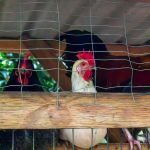Chickens, like all living creatures, have specific needs that must be met in order for them to thrive. Understanding these needs is crucial for anyone who wants to raise chickens, whether for eggs, meat, or simply as pets. Chickens require a comfortable and safe environment, a varied and nutritious diet, opportunities to engage in natural behaviors, a clean and healthy living space, social interaction with other chickens, and regular monitoring and addressing of health issues. By understanding and meeting these needs, chicken owners can ensure the well-being and happiness of their flock.
Chickens are social animals that thrive in the company of other chickens. They also need a safe and comfortable environment to live in. Additionally, chickens require a varied and nutritious diet to stay healthy and productive. It is also important to provide opportunities for chickens to engage in natural behaviors, such as scratching and dust bathing. Finally, maintaining a clean and healthy living space is essential for preventing disease and ensuring the overall well-being of the flock. By understanding and meeting these needs, chicken owners can create a happy and healthy environment for their birds.
Table of Contents
Providing a Comfortable and Safe Environment
Creating a comfortable and safe environment for chickens is essential for their well-being. This includes providing adequate shelter from the elements, protection from predators, and enough space for the chickens to move around freely. The coop should be well-ventilated and free from drafts, with plenty of natural light. It should also be secure to prevent predators from gaining access to the chickens. Additionally, the coop should be kept clean and dry to prevent the spread of disease.
In addition to a secure coop, chickens also need access to a safe outdoor area where they can roam and forage. This area should be fenced to keep predators out and provide plenty of space for the chickens to explore. Providing perches and other forms of enrichment can also help keep chickens entertained and reduce stress. By creating a comfortable and safe environment for their chickens, owners can ensure that their flock is happy and healthy.
Offering a Varied and Nutritious Diet
A varied and nutritious diet is essential for the health and well-being of chickens. Chickens require a balanced diet that includes a mix of grains, protein, vitamins, and minerals. This can be achieved through a combination of commercial feed, kitchen scraps, and foraged plants and insects. It is important to provide access to fresh water at all times, as dehydration can quickly lead to illness or death in chickens.
In addition to providing a balanced diet, it is important to monitor the chickens’ food intake to ensure that they are getting enough to eat. Overfeeding can lead to obesity and other health problems, while underfeeding can result in malnutrition and poor egg production. By offering a varied and nutritious diet, chicken owners can ensure that their flock remains healthy and productive.
Encouraging Natural Behaviors
Chickens have natural behaviors that are important for their physical and mental well-being. These behaviors include scratching, dust bathing, perching, and foraging for food. Providing opportunities for chickens to engage in these behaviors is essential for their overall health and happiness. This can be achieved by providing plenty of space for the chickens to move around, as well as access to natural materials such as dirt, sand, and straw.
In addition to providing opportunities for natural behaviors, it is important to observe the chickens’ behavior to ensure that they are not experiencing stress or boredom. Chickens that are unable to engage in natural behaviors may become aggressive or develop other behavioral problems. By encouraging natural behaviors, chicken owners can help their flock stay happy and healthy.
Maintaining a Clean and Healthy Living Space
Maintaining a clean and healthy living space is essential for preventing disease and ensuring the overall well-being of the flock. This includes regularly cleaning the coop, removing soiled bedding, and providing adequate ventilation to prevent the buildup of ammonia from chicken waste. It is also important to regularly inspect the coop for signs of pests or other potential health hazards.
In addition to keeping the coop clean, it is important to provide regular access to fresh water and clean food. Dirty water or contaminated food can quickly lead to illness in chickens. By maintaining a clean and healthy living space, chicken owners can prevent disease and ensure the overall well-being of their flock.
Chickens are social animals that thrive in the company of other chickens. Providing opportunities for social interaction is essential for their mental well-being. This can be achieved by keeping a small flock of chickens together, as well as providing opportunities for them to engage in natural behaviors such as dust bathing and foraging for food. It is also important to observe the chickens’ behavior to ensure that they are not experiencing stress or aggression.
In addition to providing opportunities for social interaction with other chickens, it is important for chicken owners to spend time with their flock on a regular basis. This can help build trust between the chickens and their owner, as well as provide opportunities for enrichment and mental stimulation. By providing social interaction, chicken owners can help their flock stay happy and healthy.
Monitoring and Addressing Health Issues
Regular monitoring of the flock is essential for identifying and addressing health issues before they become serious problems. This includes observing the chickens’ behavior, checking for signs of illness or injury, and monitoring egg production. It is also important to keep an eye on the cleanliness of the coop and the overall well-being of the flock.
In addition to regular monitoring, it is important to have a plan in place for addressing health issues as they arise. This may include consulting with a veterinarian or other poultry expert, administering medication or other treatments as needed, and isolating sick or injured birds from the rest of the flock. By monitoring and addressing health issues, chicken owners can ensure the overall well-being of their flock.
In conclusion, understanding and meeting the needs of chickens is essential for ensuring their well-being and happiness. By providing a comfortable and safe environment, a varied and nutritious diet, opportunities to engage in natural behaviors, a clean and healthy living space, social interaction with other chickens, and regular monitoring and addressing of health issues, chicken owners can create a happy and healthy environment for their birds. Whether raising chickens for eggs, meat, or simply as pets, it is important to prioritize the well-being of the flock in order to ensure their long-term health and productivity.
Meet Walter, the feathered-friend fanatic of Florida! Nestled in the sunshine state, Walter struts through life with his feathered companions, clucking his way to happiness. With a coop that’s fancier than a five-star hotel, he’s the Don Juan of the chicken world. When he’s not teaching his hens to do the cha-cha, you’ll find him in a heated debate with his prized rooster, Sir Clucks-a-Lot. Walter’s poultry passion is no yolk; he’s the sunny-side-up guy you never knew you needed in your flock of friends!







